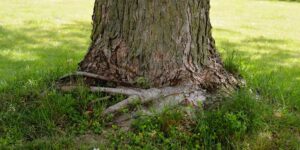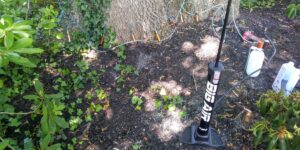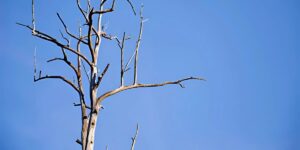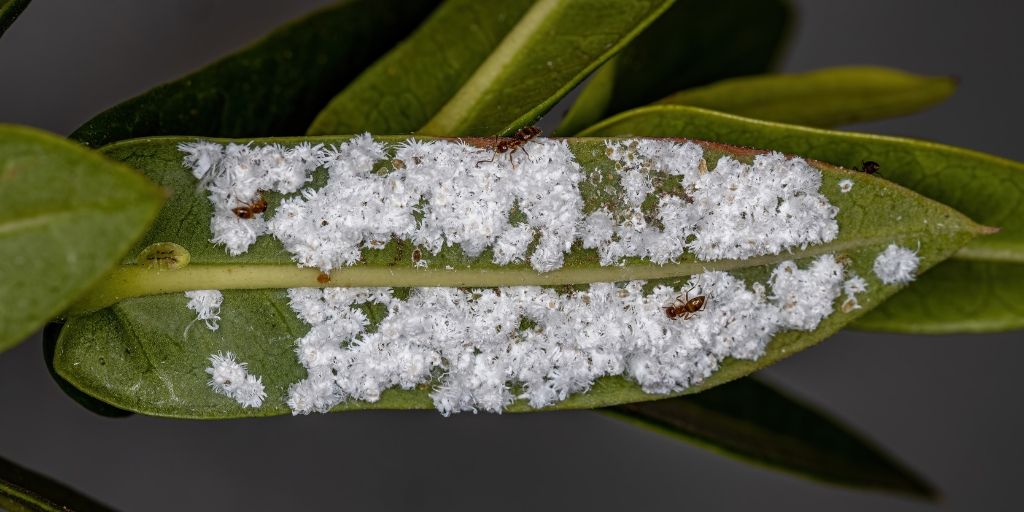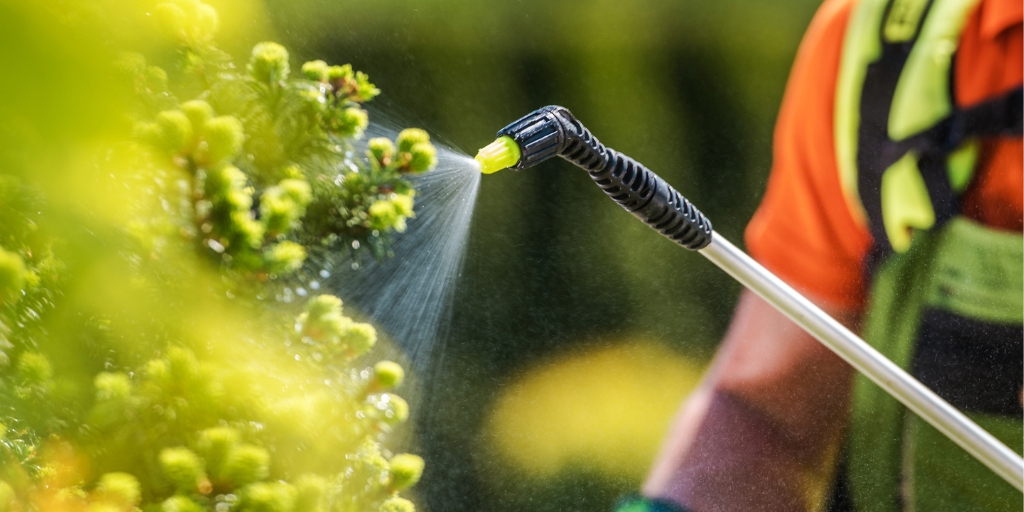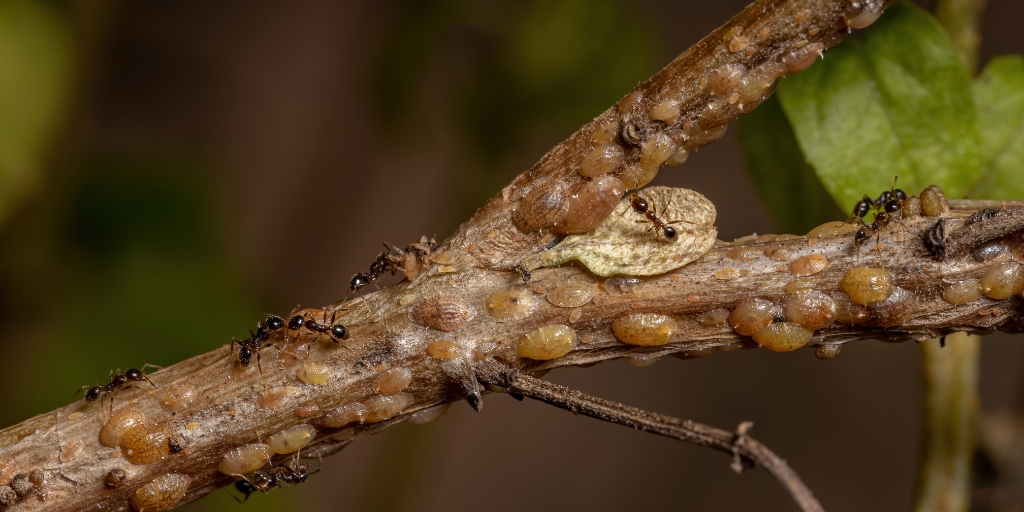You may not see them, but they're there - hundreds of tiny pests quietly draining the life from your trees. Scale insects are a formidable threat, capable of causing widespread tree and landscape damage before you even realize they've invaded.
Don't let scale insects gain a foothold on your property. Learn to recognize the signs of a scale infestation and how to stop it so you can protect your valuable landscape trees. This guide covers the essential facts every homeowner needs to know about identifying, controlling, and preventing scale. Don't let these pests wreak havoc in your yard. Keep reading to learn the proactive steps you can take to outsmart scale insects and safeguard your trees.
Key Takeaways About Scale Insects
- Early detection is difficult - scale insects are tiny and masters of disguise on tree bark.
- Biological controls like ladybugs and parasitic wasps are front-line defenders against scale.
- Insecticides require precise timing during the vulnerable crawler stage to be effective.
- Armored scales attack branches and are more difficult to control while soft scales damage foliage and produce honeydew that encourage the growth of sooty mold.
- The best way to prevent scale infestation is to keep your trees healthy through proper tree care practices.
Scales Insects in New Jersey: What They Are and Why to Be Concerned
Scale insects form the infraorder Coccomorpha - a group of sap-feeding pests that afflict trees. Even pros find scales tricky to manage.
Arborists categorize scales into two types:
Armored Scales
Armored scales create protective shields from shed skins and wax. These shields are not attached to their body, acting as a coat of armor that protects them from predators and insecticide treatments. This makes them more difficult to manage than soft scales,
Soft Scales
Soft scales have a waxy coating as part of their body and are generally easier to treat than armored scales.
While behaviors, treatment options, and damage differ slightly between types, all scale insects feed on tree sap to survive and reproduce.
PRO TIP: It can take a few years for scales to go from a minor nuisance to an existential threat to your trees. Be proactive to avoid unnecessary damage to your trees.
Signs of Scale Infestation on Trees
Detecting scale insects on trees can be a frustrating experience. Both soft and armored scales are small and difficult to see throughout most life stages and are easily missed without an up-close examination. Scales also blend in with tree bark, making early detection even more difficult.
Monitor for Honeydew and Sooty Mold
Soft scales excrete honeydew, a sugary liquid waste that attracts other insects (such as ants) and encourages the growth of black sooty mold. Look for the following signs that may indicate a soft-scale infestation:
- Look for a shiny, sticky liquid on trees, as well as on the ground or surfaces beneath the tree
- Check for sooty mold on surfaces that have been coated with honeydew. As its name suggests, sooty mold is a dark, fuzzy fungus that looks a lot like smeared soot.
- Also look for other sap-sucking pests, like aphids, that produce honeydew. The presence of honeydew or sooty mold could be due to insects other than scales.
Watch for Increased Ant Activity
Ants feed on honeydew, so more ants crawling on your tree may signify the presence of scale.
Inspect for Crawlers
Crawlers are more visible than overwintering or adult scales. Use a magnifying glass and check for crawlers near areas where you see possible signs of damage. You can also try the following methods:
- Shake a branch over a sheet of white paper. If you see crawlers moving around on the paper or any reddish marks, it’s an indication that scale insects have invaded your tree.
- Wrap a strip of double-sided tape around several branches. Anything that crawls over the tape will get stuck, letting you take a closer look to see if scale crawlers are present.
Lifecycle of Scale Insects on Trees in New Jersey
Scale insects go through three major phases: eggs, nymphs (crawlers), and adults.
The eggs hatch into nymphs, and arborists typically refer to them as crawlers. As crawlers, the scale insects will move from their birthplace to find a new location to feed and grow. Some crawlers will remain on the same tree they were born on, while others are carried by wind or birds to other trees.
Soft scales typically move to foliage first and then go to twigs or branches to finish their life and build a protective shell. Most armored scales do not feed on foliage, though a few species may attack leaves. Once an armored scale finds a spot to grow, it will lose its legs and ability to reposition itself.
After growing, the winged armored scale males will mate with females. The females lay their eggs under the protective shell and die.
Unfortunately for homeowners, the cold weather of New Jersey will not defeat these pests, as they live through the winter and continue
reproducing the next season. Soft scales typically overwinter as nymphs or adults, while armored scales overwinter as eggs.
When to Check for Scale Insects on Trees in New Jersey
One of the frustrating things about scale insects is the inconsistent crawler stage timing between species. In New Jersey, some scale insects enter the crawler stage in mid-spring (May), while others delay until early July.
Determining When Crawlers Will Emerge
Consult an arborist about typical crawler emergence for the tree species on your property. Once you know when to look, start checking for crawlers shortly before their expected appearance. Arborists use Growing Degree Days (GDD) to predict crawler timing more accurately than calendar dates.
What are Growing Degree Days?
GDD measures seasonal heat accumulation by calculating the number of days with temperatures above 50°F and factoring in how much above 50°F each day was. For instance, a day with an average daily temperature of 69 degrees would contribute 19 growing degree days to the calendar. Once you know how many degree days to look for, you can use the GDD calculator from Cornell to get an idea of when you should check for scale.
Environmental Conditions Favorable to Scale Insects
Scale insects thrive in hot, dry weather.
Rainfall can knock crawlers off trees before they resettle, leaving them unable to make it back to the tree before they die.
Warmer early spring temperatures accelerate crawler emergence, so monitor scale activity closely during hot, dry periods.
Scale Insect Treatment Options
Now it’s time for the million-dollar question: what do you do when you detect scale insect infestation on your trees? The two primary pest management methods we recommend are biological controls and chemical controls.
Typically, we recommend you start with biological treatment to try to control the scale population. Only move onto chemical methods if the infestation cannot be controlled through biological means.
Biological Controls for Scale Insects in New Jersey
Biological controls are the primary management method for manageable scale infestations. Introducing beneficial insects that prey on scales can lower populations and prevent widespread infestation.
Beneficial Insects for Scale Control
Ladybugs/Lady Beetles
Both the larvae and adults of ladybugs, also known as lady beetles, feed on scales. They’re able to get under the scale’s protective shield to reach the pest itself.
Parasitic Wasps
Female parasitic wasps lay eggs inside scale insects. When the eggs hatch, the larvae consume the scale from within. If you notice blackened scale insects on your trees, it’s a sign that a parasitic wasp killed them.
The success of beneficial insects on your property at controlling pest populations is a primary reason why we recommend holding off on using chemicals as long as you can. Some of these chemicals may harm predators who are helping keep the pest population under control.
When to Use Insecticides for Scale Insects
While you should consider chemicals to be a last resort, they still have their place in pest management. We recommend two main chemical methods for controlling scale insects in New Jersey: horticultural oils and insect growth regulators.
WARNING: Always hire professional pesticide applicators. Improper chemical usage can cause injury, environmental damage, and landscape harm.
Horticultural oils are most effective when used during the winter. The oil should destroy any overwintering scales on your trees.
Insect growth regulators disrupt crawler development when applied during that stage, leaving them unable to mature into reproductive adults.
Timing insecticide application is one of the aspects that makes scale insects so difficult to deal with. Chemicals are often not effective if applied before or after the crawler stage, so precise timing is neces-sary for effective scale control.
Damage Caused by Scale Infestations
At low populations, scale insects cause only minimal damage and may be difficult for you to detect. Only after the scale insect population increases will you notice visible signs of damage to your trees.
Armored scales do the most damage, feeding on branches and potentially killing them. Over time, branch dieback and the associated loss of foliage can significantly weaken a tree, making it necessary to remove it.
Soft scales damage foliage, causing yellowing and wilting. The honeydew these pests excrete attracts other pests and encourages the development of sooty mold fungus.
Preventing Scale Insect Infestations
Stressed trees are always more susceptible to pests and diseases than healthy ones. Keeping your tree healthy through proper watering, nutrition/fertilization, and pest/disease management will help prevent infestation by scale insects, as well as many other pests.
Proper pruning can also help to discourage scale.
Regularly inspect your trees for early signs of scale activity, and call a local arborist if you notice anything that concerns you.
Don't Let Scale Insects Destroy Your Trees - Call Alpine Tree Today
Scale insects are notoriously difficult to detect and control, but leaving them unchecked can severely damage or even kill your trees. From unsightly aesthetic harm to crippling infestations, these pests pose a serious threat.
Don’t face scale insects alone. The experts at Alpine Tree have years of experience identifying, managing, and eliminating scale problems in New Jersey. We use proven biological controls and properly timed insecticide applications to get scales under control.
Protect your landscape's beauty and your trees' health—contact Alpine Tree today for a scale insect inspection and customized treatment plan. Call 973-964-7798 now before scale insects take over your property.


